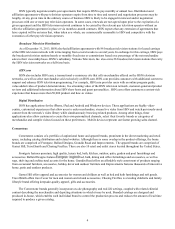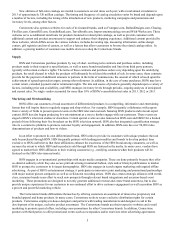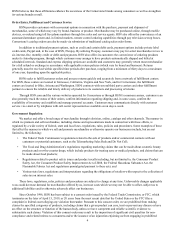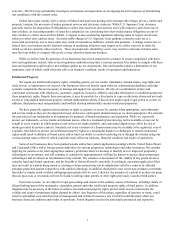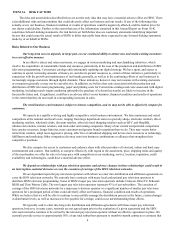Home Shopping Network 2013 Annual Report Download - page 16
Download and view the complete annual report
Please find page 16 of the 2013 Home Shopping Network annual report below. You can navigate through the pages in the report by either clicking on the pages listed below, or by using the keyword search tool below to find specific information within the annual report.14
Failure to comply with existing laws, rules and regulations, or to obtain and maintain required licenses and rights
could subject us to additional liabilities.
We market and provide a broad range of merchandise through television, digital, catalogs and other channels. As a
result, we are subject to a wide variety of statutes, rules, regulations, policies and procedures in various jurisdictions which are
subject to change at any time, including laws regarding product safety, consumer protection, privacy, the regulation of retailers
generally, the importation, sale and promotion of merchandise and the operation of retail stores and warehouse facilities, as
well as laws and regulations applicable to the internet and businesses engaged in digital commerce, such as those regulating the
sending of unsolicited, commercial electronic mail. Our failure to comply with these laws and regulations could result in fines
and/or proceedings against us by governmental agencies and/or consumers, which could adversely affect our business, financial
condition and results of operations. Moreover, unfavorable changes in the laws, rules and regulations applicable to us could
decrease demand for merchandise offered by us, negatively impact our marketing efforts, increase costs, subject us to
additional liabilities and/or otherwise adversely affect our businesses.
Restrictive covenants in our debt instruments could limit our flexibility to respond to current market conditions or
otherwise restrict our business activities.
The existence of, and limitations on the availability of, our debt could have important consequences. The existence of
debt could, among other things:
• require a substantial portion of our cash flow from operations to be dedicated to the payment of principal and
interest on our indebtedness;
• limit our ability to use cash flow or obtain additional financing for future working capital, capital expenditures or
other general corporate purposes;
• increase our vulnerability to general economic and industry conditions; or
• expose us to the risk of increased interest rates for that portion of our borrowings under our credit facilities that are
at variable interest rates.
Our credit facility includes restrictive financial and non-financial covenants. Limitations imposed as a part of the
debt, such as the availability of credit and the existence of restrictive covenants may, among other things, make it difficult for
us to satisfy our financial obligations; and/or limit our ability to respond to business opportunities.
There are risks associated with our acquisitions.
Mergers and acquisitions entail a number of risks including, among other things, higher than anticipated acquisition
costs and expenses, the difficulty and expense of integrating the operations and personnel of the companies and the loss of key
employees and customers as a result of changes in management. We may not be successful in overcoming these risks or any
other problems encountered in connection with any acquisition.
Acquisition valuations require us to make certain estimates and assumptions to determine the fair value of the acquired
entities (including the underlying assets and liabilities). If our estimates or assumptions used to value acquired assets and
liabilities are not accurate, we may be exposed to losses that may be material.
Risks Related to Our Common Stock
The shareholders’ rights plan adopted by the Board of Directors in December 2008 may inhibit takeovers that would
otherwise be beneficial to shareholders.
In the fourth quarter of 2008, our Board of Directors approved the creation of a Series A Junior Participating Preferred
Stock, adopted a shareholders’ rights plan and declared a dividend of one right for each outstanding share of common stock
held by our shareholders. Initially, these rights, which trade with the shares of our common stock, are not exercisable. Under
the rights plan, these rights will be exercisable if a person or group acquires or commences a tender or exchange offer for 15%
or more of our common stock (except for certain grandfathered persons to which higher thresholds apply). If the rights become
exercisable, each right will permit the holder, other than the “acquiring person,” to purchase from us shares of common stock at
a 50% discount to the then prevailing market price. As a result, the rights will cause substantial dilution to a person or group
that becomes an “acquiring person” on terms not approved by our Board of Directors. The existence of these rights may
prevent, discourage or delay us from being acquired, even if such acquisition would be beneficial to our shareholders.


